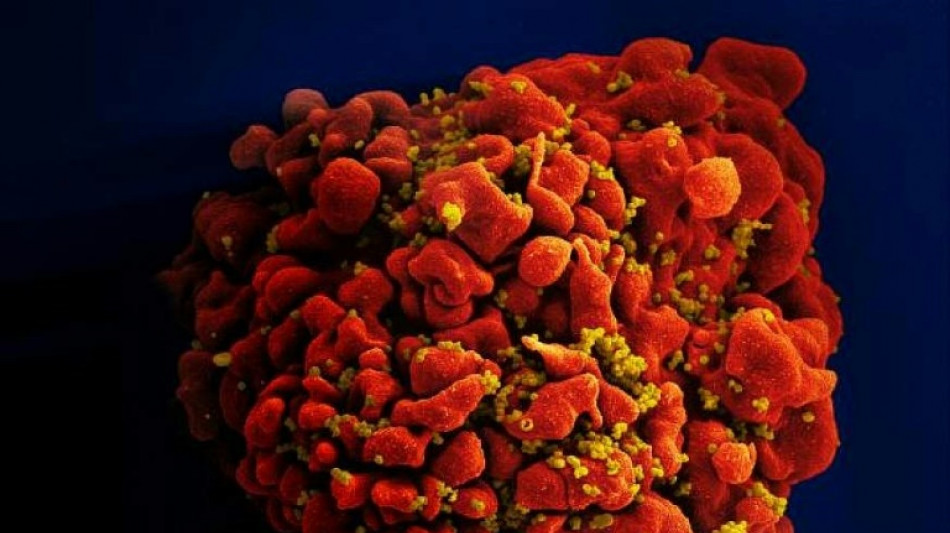
-
 Russian strike could collapse Chernobyl shelter: plant director
Russian strike could collapse Chernobyl shelter: plant director
-
Springbok captain Kolisi to rejoin Stormers

-
 Italy fines Ryanair $300 mn for abuse of dominant position
Italy fines Ryanair $300 mn for abuse of dominant position
-
Mahrez eyes strong AFCON showing from Algeria

-
 Killer in Croatia school attack gets maximum 50-year sentence
Killer in Croatia school attack gets maximum 50-year sentence
-
Thousands of new Epstein-linked documents released by US Justice Dept

-
 Stocks steady as rate cut hopes bring Christmas cheer
Stocks steady as rate cut hopes bring Christmas cheer
-
Bangladesh summons Indian envoy as protest erupts in New Delhi

-
 Liverpool's Isak faces two months out after 'reckless' tackle: Slot
Liverpool's Isak faces two months out after 'reckless' tackle: Slot
-
For director Josh Safdie, 'Marty Supreme' and Timothee Chalamet are one and the same

-
 Kyiv's wartime Christmas showcases city's 'split' reality
Kyiv's wartime Christmas showcases city's 'split' reality
-
Locals sound alarm as Bijagos Islands slowly swallowed by sea

-
 Cambodia asks Thailand to move border talks to Malaysia
Cambodia asks Thailand to move border talks to Malaysia
-
In Bulgaria, villagers fret about euro introduction

-
 Key to probe England's 'stag-do' drinking on Ashes beach break
Key to probe England's 'stag-do' drinking on Ashes beach break
-
Delayed US data expected to show solid growth in 3rd quarter

-
 Thunder bounce back to down Grizzlies, Nuggets sink Jazz
Thunder bounce back to down Grizzlies, Nuggets sink Jazz
-
Amazon says blocked 1,800 North Koreans from applying for jobs

-
 Trump says US needs Greenland 'for national security'
Trump says US needs Greenland 'for national security'
-
Purdy first 49er since Montana to throw five TDs as Colts beaten

-
 North Korea's Kim tours hot tubs, BBQ joints at lavish new mountain resort
North Korea's Kim tours hot tubs, BBQ joints at lavish new mountain resort
-
Asian markets rally again as rate cut hopes bring Christmas cheer

-
 Australian state poised to approve sweeping new gun laws, protest ban
Australian state poised to approve sweeping new gun laws, protest ban
-
Trapped under Israeli bombardment, Gazans fear the 'new border'

-
 Families want answers a year after South Korea's deadliest plane crash
Families want answers a year after South Korea's deadliest plane crash
-
Myanmar's long march of military rule

-
 Disputed Myanmar election wins China's vote of confidence
Disputed Myanmar election wins China's vote of confidence
-
Myanmar junta stages election after five years of civil war

-
 Ozempic Meals? Restaurants shrink portions to match bite-sized hunger
Ozempic Meals? Restaurants shrink portions to match bite-sized hunger
-
'Help me, I'm dying': inside Ecuador's TB-ridden gang-plagued prisons

-
 Australia's Cummins, Lyon out of fourth Ashes Test
Australia's Cummins, Lyon out of fourth Ashes Test
-
US singer Barry Manilow reveals lung cancer diagnosis

-
 'Call of Duty' co-creator Vince Zampella killed in car crash
'Call of Duty' co-creator Vince Zampella killed in car crash
-
The Alkaline Water Company Announces Capital Structure Reset and Strategic Alignment Ahead of Regulation A Offering

-
 Peraso Appoints Wireless Veteran Cees Links to Board of Directors
Peraso Appoints Wireless Veteran Cees Links to Board of Directors
-
Amazing Community Support Signals Huge Success for Today's "Toys for Joy" Giveaway Organized by Rapper Mistah F.A.B. and Oakland's Church of Ambrosia

-
 Vero Technologies Celebrates Five Years Leading Asset Finance Innovation
Vero Technologies Celebrates Five Years Leading Asset Finance Innovation
-
DealFlow Discovery Conference Announces Keynote Fireside Chat and Book Signing with Venture Capital Pioneer Alan Patricof

-
 PetVivo Holdings, Inc. Presenting at the 3rd Annual DealFlow Discovery Conference
PetVivo Holdings, Inc. Presenting at the 3rd Annual DealFlow Discovery Conference
-
Green Leaf Innovations, Inc. Announces FINRA Approval of Reverse Stock Split and Strategic Reduction of Authorized Share Capital

-
 Laser Photonics Reports Q3 2025 Revenue Growth of 28% Year-Over-Year
Laser Photonics Reports Q3 2025 Revenue Growth of 28% Year-Over-Year
-
BeMetals Announces Settlement of All Outstanding Debt

-
 Who Does the Best Mommy Makeover in Bellevue?
Who Does the Best Mommy Makeover in Bellevue?
-
Zenwork Joins CERCA to Support IRS Modernization and Strengthen National Information Reporting Infrastructure

-
 Cellbxhealth PLC Announces Holding(s) in Company
Cellbxhealth PLC Announces Holding(s) in Company
-
Top Gold IRA Companies 2026 Ranked (Augusta Precious Metals, Lear Capital and More Reviewed)

-
 Karviva Announces Launch of Energy and ACE Collagen Juices at Gelson's Stores This December
Karviva Announces Launch of Energy and ACE Collagen Juices at Gelson's Stores This December
-
MindMaze Therapeutics: Consolidating a Global Approach to Reimbursement for Next-Generation Therapeutics

-
 Decentralized Masters Announced as the Best Crypto Course of 2025 (Courses on Cryptocurrency Ranked)
Decentralized Masters Announced as the Best Crypto Course of 2025 (Courses on Cryptocurrency Ranked)
-
Trump says would be 'smart' for Venezuela's Maduro to step down


New 'highly virulent' HIV strain discovered in the Netherlands
Oxford researchers announced Thursday the discovery of a highly virulent strain of HIV that has been lurking in the Netherlands for decades, but because of the effectiveness of modern treatments, is "no cause for alarm."
Their analysis, published Thursday in the journal "Science," showed that patients infected with what they call the "VB variant" had 3.5 to 5.5 times higher levels of the virus in their blood than those infected with other variants, as well as a more rapidly fading immune system.
However, the study also found that after starting treatment, individuals with the VB variant had similar immune system recovery and survival to individuals with other HIV variants.
"There's no cause for alarm with this new viral variant," said Oxford epidemiologist Chris Wymant, the lead author on the paper, in an interview with AFP.
The variant likely arose in the late 1980s and early 1990s in the Netherlands, according to the researchers, but began to decline around 2010.
Since modern interventions still seem to work on the variant, the research team believes that widespread HIV treatment in the Netherlands did not contribute to the virus's evolution, and that early detection and treatment are paramount.
"Our findings emphasize the importance of World Health Organization guidance that individuals at risk of acquiring HIV have access to regular testing to allow early diagnosis, followed by immediate treatment," said co-author Christophe Fraser, also an Oxford researcher, in a press release announcing the findings.
The work also supports the theory that viruses can evolve to become more virulent, a widely-hypothesized idea for which few real-world examples have been found.
The Delta variant of the novel coronavirus was another recent example.
The discovery of the HIV variant should therefore "be a warning that we should never be overconfident about saying viruses will just evolve to become milder," said Wymant to AFP.
In total, the team found 109 people infected with the VB variant, with only four living outside the Netherlands, but still in western Europe.
- 500 mutations -
The HIV virus is constantly evolving, so much so that each person infected has a slightly different version.
The VB variant, however, was found to have over 500 mutations.
"Finding a new variant is normal, but finding a new variant with unusual properties is not -- especially one with increased virulence," Wyman explained.
The research team first identified the VB variant in 17 HIV positive individuals by parsing a broad data set from the BEEHIVE project, a data collection and analysis initiative in Europe and Uganda.
Because 15 of the 17 were from the Netherlands, they further studied data from 6,700 HIV-positive Dutch individuals, identifying 92 others.
The earliest appearance of the VB variant in their data was found in someone diagnosed in 1992 who had an early version of the variant, and the most recent in 2014.
Other researchers have since found other individuals with the variant diagnosed after 2014.
Doctors usually measure HIV's deterioration of the immune system by monitoring the decline of CD4 T-cells, which are targeted by the HIV virus and pivotal for protecting the body against infections.
In patients infected with the VB variant, CD4 decline occurred twice as fast compared to other variants, "placing them at risk of developing AIDS much more rapidly," the researchers said.
In addition to its increased impact on the immune system, the team also found the VB variant to be more highly transmissible.
They came to that conclusion after comparing the different versions of the VB variant drawn from infected patients.
The fact that they were so similar suggests that the virus passed rapidly to someone else before it could accumulate many mutations.
- 'Critical' to diagnose and treat early -
"Because the VB variant causes a more rapid decline in immune system strength, this makes it critical that individuals are diagnosed early and start treatment as soon as possible," the press statement noted.
"This limits the amount of time HIV can damage an individual's immune system and jeopardize their health," added Fraser.
Fraser is also the principal investigator of the BEEHIVE project, which was launched in 2014 to gather data on how mutations in the HIV virus can lead to varying degrees of severity among patients.
Those differences have previously been thought to mostly relate to the strength of individuals' own immune systems.
The researchers said they could not identify which genetic mutation in the VB variant caused its virulence, but they hope future studies will be able to.
B.Finley--AMWN